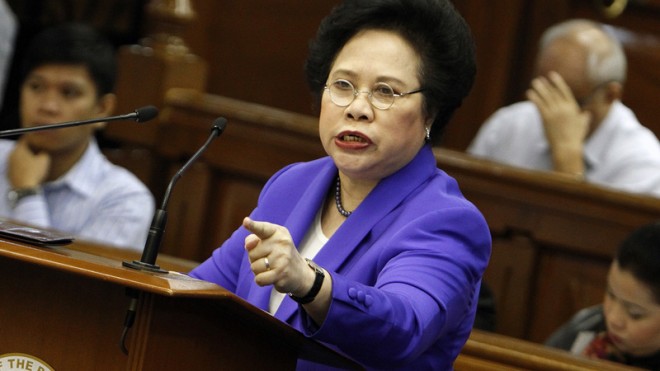Senators take home P1.4M a month–Santiago
MANILA, Philippines — Sen. Miriam Defensor-Santiago, hobbled by a chronic fatigue syndrome, made a rare appearance in a committee hearing on Tuesday, batting for the swift passage of the freedom of information (FOI) bill and urging the inclusion of a provision that would allow voters to determine if school dropouts in the Senate deserve their P1.4 million monthly pay.
Santiago told the committee headed by Sen. Grace Poe that the transparency measure should require the publication in a website of the basic salary, allowances and other incomes of all government officials amid widespread public outrage at the fat bonuses executives of the Social Security System and other state-owned firms had awarded themselves.
“It is urgent to stop corporate greed in the state bureaucracy. Those people help themselves to outrageous allowances and bonuses as if the government is an enterprise for profit. That is a sclerotic view of public service,” the feisty former trial judge fumed.
She was particularly scathing on the emoluments of members of the upper chamber based on computations by its finance and administrative services department.
“The basic monthly salary of a senator is P90,000. But if you add all other legitimate sources of income such as allowances and honoraria, the total monthly income of a senator could be placed at some P1.4 million,” she said.
Article continues after this advertisement“There are some senators who did not finish high school or college. Do we really want to pay them this high a salary? That is a valid concern that voters might want to address, if they have access to information,” she said.
Article continues after this advertisementSantiago said she wanted the public to compare the monthly income of the highest-paid public official, the President, with the income of the “lowest-paid janitor in the bureaucracy.”
“In the corporate world, there is an algorithm for determining how much should be the salary of the highest-ranking officer, because it cannot be more than the salary of the lowest employee, when multiplied by a certain factor. That should also be the practice in the public sector,” Santiago said.
Conflicting provisions
The senator also cited the maintenance and other operating expenses (MOOE) given to every senator’s office every month. “It is long past overdue to dismantle the MOOE which is a secret source of additional income for every senator,” she said.
“We should tear apart the veil of secrecy which covers total incomes of politicians. A public website should allow the citizen to access every senator’s sources of income, including MOOE, chairmanship of certain committees, membership in the Commission on Appointments, or in the oversight committees,” Santiago added.
Santiago said that while she was an ardent supporter of the long-pending FOI bill, there are two constitutional provisions that might clash with each other in the proposed measure.
“Under the Bill of Rights, on the one hand, the provision of communications and correspondence shall be inviolable. On the other hand, the right of the people to information on matters of public concern shall be recognized,” she said in a statement.
“We have to be able to finish the antagonism between these two provisions lest critics question the constitutionality of the FOI law in the Supreme Court.”
Santiago added that the FOI bill should be reconciled with the existing Data Privacy Act and other laws as well.
Duty to disclose
In her interpellation, she said that the law must draw a distinction between the mandatory duty to disclose and the duty to permit access to information.
Santiago said that in some countries, an FOI act covers only information under control of the state. She acknowledged the need for “presidential communication privilege” and that other executive officials are entitled to the “deliberative process privilege” to preserve the quality of decision-making.
She suggested that the FOI include among its exceptions those already provided under the National Internal Revenue Code, AIDS Prevention and Control Act, and Inter-Country Adoption Act, “in addition to information provided by foreign governments.”
Santiago added that a previous Supreme Court ruling stressed the provision in the Philippine Mining Act requiring the Department of Environment and Natural Resources “to maintain the confidentiality of confidential information supplied by contractors who are parties to mineral agreements.”
Campaign promise
Various FOI bills have been introduced in Congress over the years.
Senate Bill No. 1733 seeks to grant the public access to government information, excluding only sensitive national security issues. Most legislators are against the bill, fearing publication of government workings that public officials would rather keep from the people.
President Aquino, who had promised to support the bill during the 2010 presidential campaign, has expressed reservations over a provision that would make transcripts of Cabinet meetings available to the public, except those pertaining to national security and diplomacy.
With such a provision, a Cabinet official may think twice about making statements in such meetings, Aquino said.
Originally posted: 3:35 pm | Tuesday, January 28th, 2014
RELATED STORIES
Senator using gov’t funds to pay maids’ salary, says Lacson
